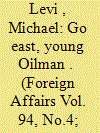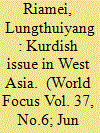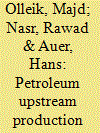| Srl | Item |
| 1 |
ID:
139348


|
|
|
|
|
| Summary/Abstract |
Most observers agree that the United States, propelled by its boom in oil and gas production, is becoming increasingly central to global energy. As oil prices have plummeted, American oil producers have taken credit. As U.S. imports have fallen, foreign policy thinkers have suggested that Washington could rely far less on the Middle East. As U.S. firms have prepared to export liquefied natural gas (LNG), market watchers have braced for a transformation of global natural gas markets and, as a result, geopolitics. And as U.S. energy companies have begun to capitalize on shale gas and renewable energy to tame their reliance on coal, scientists have hoped that Washington might finally take the lead in combating climate change. But when future historians reflect on the ongoing transformation of the global energy landscape, they won’t focus narrowly on the United States: Asia will feature at least as prominently, and interactions between the two sides of the Pacific will prove most important of all.
|
|
|
|
|
|
|
|
|
|
|
|
|
|
|
|
| 2 |
ID:
145367


|
|
|
|
|
| Summary/Abstract |
The Kurdish question continues to be an important factor in West Asian and international politics. Kurdistan has among the largest oil reserves in West Asia. According to various studies, Kurdistan sits on 43.7 billion barrels (bb) of proven oil and 25.5bb of potential reserves. In addition, the majority of the estimated 200 trillion cubic feet of gas in Iraq is reported to be in Kurdistan region. The Kurds along with the other discontented minorities are the victims of foreign intervention (colonial/neocolonial), economic and political deprivation and political repression.
|
|
|
|
|
|
|
|
|
|
|
|
|
|
|
|
| 3 |
ID:
180090


|
|
|
|
|
| Summary/Abstract |
Developing countries endowed with petroleum resources face various challenges in balancing their economic development needs and their contribution to combating climate change. They aim at increasing their reliance on renewable energy; however, they are faced with regulatory, financial, technical, and knowledge-related barriers. Many oil and gas companies started to transition from their core business in oil and gas to the wider energy field. In this paper, we show how the most common contractual arrangement between developing countries and oil and gas companies - the Production Sharing Contract (PSC) - can be modified to include renewable energy elements. We introduce a Renewable Contribution parameter that defines the share of the company profit petroleum that should be re-invested in renewable energy in the host country and we develop an optimization model that defines the state objective function and constraints. We apply the modified PSC to the case of Lebanon after populating various oil and gas and renewable energy scenarios. We show that a limited Renewable Contribution of 10% can provide a large share of the investment needs of the renewable energy sector and can contribute to emission reduction, economic development and job creation while providing companies with attractive economic incentives.
|
|
|
|
|
|
|
|
|
|
|
|
|
|
|
|